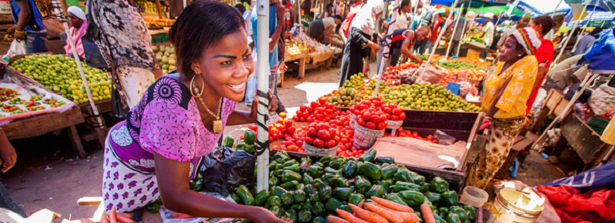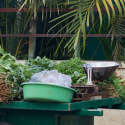COVID-19 and the impact on food security: suggestions for the Dutch international effort

As a result of a parliamentary debate on April 16, 2020, the Dutch government has asked the Advisory Council on International Affairs to urgently draw recommendations on the role of the Netherlands in combating and mitigating the impact of the COVID-19 crisis in developing countries. Members of the AgriProFocus Food Security Policy Coalition, including HIVOS, ICCO Cooperation, Oxfam Novib and SNV, ask the government to pay attention to four measures that will protect global food security in the short and medium term.
| Document to download |
|
The global crisis caused by the COVID-19 outbreak is of unprecedented proportions, and the consequences of both the virus outbreak and the restrictive measures taken by governments are being felt in all countries worldwide. In addition to the risks of further spread of the virus and the overburdened healthcare systems, the most acute risk is that the global economic recession will rapidly lead to a food crisis of extraordinary magnitude.
Before the COVID-19 crisis, 135 million people were already suffering from acute hunger; in the current situation, according to the World Food Program, the number of acutely hungry people will double to 265 million without the intervention of the international community. Particularly in low and middle income countries (LMICs), and especially in the cities, there is reason for great concern.
In order to prevent a food crisis, we ask the government to immediately make available the necessary additional resources, so that food and emergency aid (where possible in the form of cash transfers) can be provided to the affected population. Preferably in cooperation with local civil society organisations, which have relevant expertise and locally embedded networks. In addition, in the short term it must be ensured that crops can be harvested and that the coming sowing season can be fully utilised. By ensuring this, farmers are able to access the necessary inputs and financial service; markets can remain open (in an appropriate way); farm workers can continue to do their work; safe working conditions are created in the fields and in food processing companies; and no export restrictions are introduced. This is something that the international community should urge the countries concerned to ensure.
In order to mitigate the effects of the COVID-19 crisis in LMICs in the medium term, and to prevent future (food-related and other) crises, we ask the Dutch government to work bilaterally and through EU and UN channels to implement the following four policy-related measures:
1. Address structural causes of various interlinked crises: adopt the food system approach
Virus outbreaks such as COVID-19, but also other crises such as the food security, climate and biodiversity crises, do not stand alone. They are a direct consequence of the interconnectedness of people around the world and the way people deal with the earth and its finite resources. The current way of producing, distributing, marketing and consuming food is an important causal factor in these crises. A transition to a more sustainable food system is part of the solution. A well thought-out and coherent food system approach is needed to mitigate the above crises.
2. Accelerate the transition to sustainable, resilient and ecologically sustainable agricultural production systems that can withstand the effects of climate change
Many food production practices lead to sub-optimal yields, losses in the production process, impoverished soils, one-sided food consumption and inadequate food safety. In addition, current systems offer little resilience to a changing climate and other crises, such as pandemics. The large-scale transition to- and international promotion of circular agriculture (as already embraced by the Dutch government) as the standard for the future offers a solution here. The closing of local nutrient cycles, diversity as a starting point in food production and consumption, and the promotion of agroecological production practices, should be central to this.
3. Strengthen local and regional markets and focus on local (male and female) farmers and entrepreneurs
Small-scale entrepreneurs are the engine of any economy, especially in developing markets. Now that economic activity is decreasing as a result of government intervention, entrepreneurs in the informal economy are the first and hardest hit. Small-scale farmers, food processors and their employees, marketers, day labourers, and other SMEs in food chains play a crucial role in the (local) food supply and they must be supported in keeping the food supply going, during and after the COVID-19 crisis. A policy focus on the development of local and regional markets should therefore be a priority.
4. Strengthen the position of women and girls, given their crucial role in food supply and care
Women play an important role both in the production and marketing of food and in household consumption patterns. As a result of the crisis, they now face additional challenges. They are losing their jobs and incomes, which puts pressure on the daily meals and education costs of children. They are at the forefront of caring for the sick (with all the risks that that entails) and in many places violence against women is on the increase. Therefore it is crucial to ensure that support measures are gender-sensitive, and long-term measures that strengthen the position of women and girls are advocated and developed.
Overall recommendation: Additional resources are needed to implement measures
To enable the governments of LMICs to take the necessary steps without using money for other urgent purposes – such as climate mitigation and adaptation – debt relief as advocated by, among others, the United Nations Conference on Trade and Development (UNCTAD) is important. In addition, the international community will have to provide additional resources.
The coalition asks the Dutch government to ensure that a significant part of the package of measures to combat the impact of the COVID-19 virus is aimed at securing food security worldwide in both the short and medium term.
_ _ _
Source: AgriProFocus online platform







Thanks for the suggestion on the impacts of COVID-19 on food security. I fully agree to the areas mentioned and I would like to add few suggestions
1. Timely land preparation and planting is key to achieving optimum production and food security. But small holder farmers in Ethiopia rely on animal drawn farm implement and “communal farming, weeding, etc locally known as “DEBO”. This is restricted to keep soicial distance among communities to prevent Corona. Hence mechanization support in the form of rental tractor, harrow, planter etc are pressing needs particularly for women headed households, persons with disability etc
2. Market restrictions, transportation service reductions coupled with post harvest management challenges which causes serious loss will add problem. Particularly horticultural crop growers will be affected most because of the perishability of vegetables and fruits and lack of refrigrated store. Hence, I see processing and other post harvet management mechanisms are needed